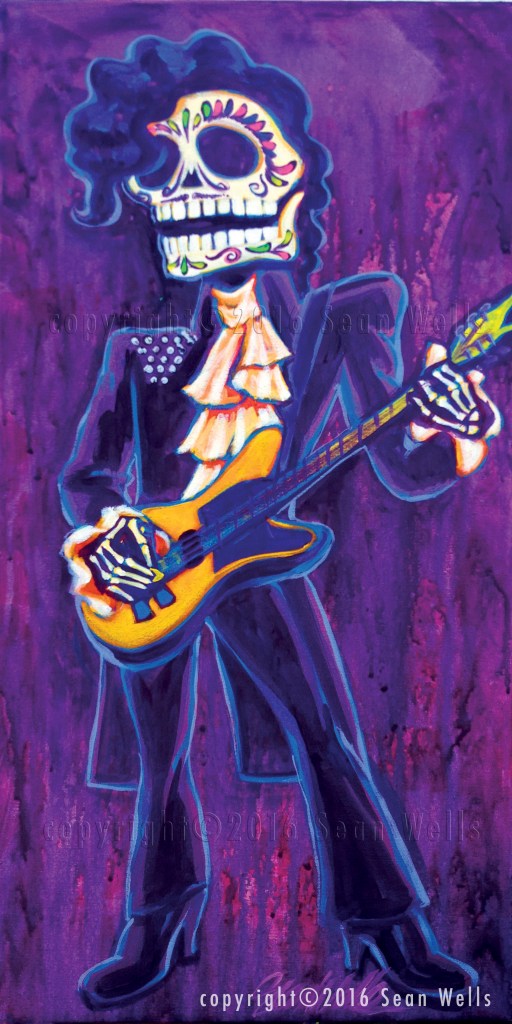The outpouring of tributes and public displays of grief over the death of the rock star Prince is remarkable. Contrast this reaction with the very private and low-key cremation held for the famously reclusive Prince.
When celebrities die, people mourn publicly in ways that they might not for their own family members.
After hearing the news of his death, artist Sean Wells, a huge Prince fan, overnight made this meurto painting in tribute. Meurto artwork, inspired by the Day of the Dead, celebrates eternal life through images of skeletons doing everyday things. Through his music and popular culture influences, Prince will remain immortal.
Dr. Robert Neimeyer is one of the foremost authorities on bereavement and grief. In this blog post, he responded to a reporter’s question about the huge emotional reactions of the public to Prince’s death with wise advice we can apply to our own lives:
Dear Dr. Neimeyer,
The death of Prince raises several interesting questions about grief following the death of a celebrity.
Is it possible to truly grieve for someone you’ve never met personally? So many posts on Facebook state that people are “gutted,” “heartbroken”, “devastated” in the wake of this very public loss.
As with the deaths of John F. Kennedy, Michael Jackson, Princess Diana, Eva Peron and David Bowie, why do you suppose people feel such strong bonds to certain celebrities and public figures? Grief and grieving are complex, I know, but might you have any advice for people on how to cope with/heal from the death of a celebrity?
Sofi Papamarko, Reporter with the Toronto Star
Dear Sofi,
We grieve all those to whom we are attached, whether by bonds of kinship, love, or identification. When the person we lose matters to us greatly, loss of their presence and participation–even symbolic participation–in our lives leaves us feeling reduced and impoverished, and the sadness, withdrawal and loss of meaning that we call grief is a natural response.
Rather than questioning the legitimacy of this experience in the case of the death of a celebrity with whom we are highly identified, it might be more appropriate to marvel at the human capacity to invest ourselves greatly in the lives of others, well beyond our immediate circle of family and friends.
In a sense, the loss of a public figure can trigger the purest form of grief, in the sense that they may embody our ideals in a way that is less complicated by the disappointment, ambivalence and occasional conflict that can characterize our closest relationships. Celebrities in particular may exemplify our values, ideals and aspirations, and so their death may represent the death of a part of ourselves.
Especially when this identification was forged in our teen years, when we are passionately seeking models on which to construct an emerging sense of self, our bonds with famous figures can be intense, and for the part of us that yearns to retain that youthful part of ourselves, witnessing their passing easily triggers our nostalgia for a keenly meaningful chapter in our own life stories, and the resulting grief can be very real.
One ironic advantage of losing a celebrity with whom we are highly identified is that countless others will be mourning the same loss, affording us generous opportunities to share our grief and our remembrance of the deceased. Many losses in life are relatively invisible, and easily become silent stories that find no audience, leaving us feeling more alone and disconnected from the social world.
In contrast, the death of a celebrity offers numerous opportunities to honor the deceased in venues as public as mass funerals or celebrations of their lives, and as private as an anonymous post on a grief blog or web site. For some, reflecting on what features the celebrity embodied that we value (whether creativity, the pursuit of social justice, or achievement) and can strive to extend in our own lives can be a source of both consolation and personal growth, honoring the other by dedicating ourselves to continuing their legacy.
–Dr. Neimeyer
While thousands of mourning fans gathered outside Prince’s home and recording studio near Minneapolis, he was cremated at a modest funeral home with only a handful of family present. This very private send-off for this most celebrated singer/songwriter/musician was totally different from the memorial service held for Michael Jackson in 2009, which was attended by music royalty and broadcast on television around the world. There’s word that a musical memorial service is in the works for Prince, but what a difference for the disposition of these two musical giants.
News broke today that Prince’s sister said that he died without a will. This is according to documents filed Tuesday by his sister, Tyka Nelson, in probate court for Carver County, Minn., where the beloved pop icon died suddenly last week at his Paisley Park compound.
“The Decedent died intestate,” Nelson said in her petition for the appointment of a special administrator to deal with Prince’s estate, which has been widely reported to be valued at $300 million. Nelson said her brother left no surviving spouse, no children and no parents.
Being of the same age as both these musicians, the Doyenne of Death encourages you to make your funeral plans now, and let your loved ones know what those plans are. And while you’re at it, if you’re over the age of 18, prepare a will and advance medical directives. We never know when this day will be our last day.
As Prince put it in his song 1999, “But life is just a party and parties weren’t meant 2 last… We could all die any day… I don’t wanna die, I’d rather dance my life away.”

